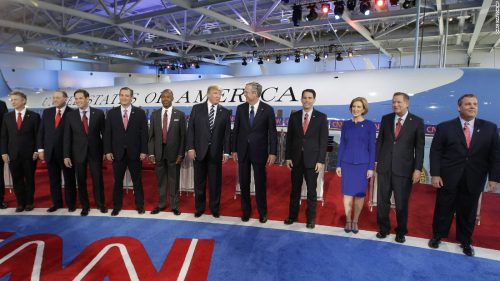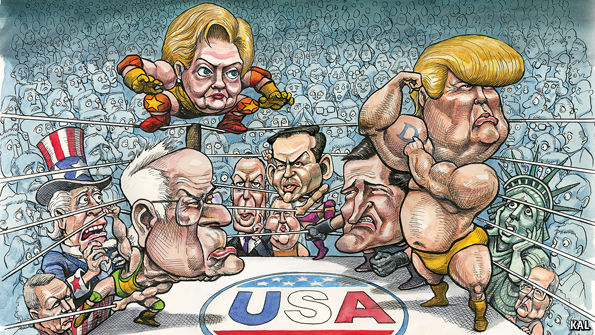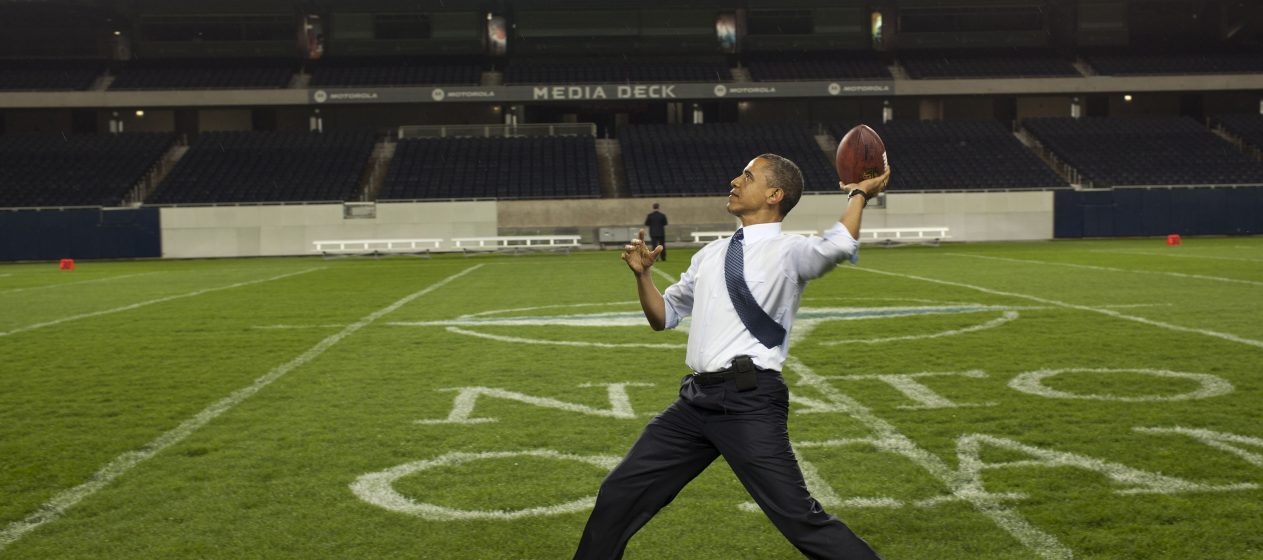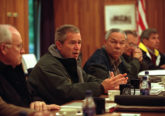‘The Brawl Begins’, an article about the 2016 primaries in The Economist provides the most overt manifestation of how a discourse of sports has permeated contemporary political reporting. Describing elections as a “jaw-dropping spectacle” or referring to the Iowa caucuses as the “opening round” in a political boxing match, a prime example of horse-race journalism, is particularly prevalent in presidential primary elections. This is due to the lengthening of the primary period and the truism that the “newsworthiness of what a candidate says about public policies is limited” because “once a candidate makes known his position on an issue, further statements concerning that issue decline in news value”.[1] In these elections, televised debates – which Craig Allen Smith compares to the Super Bowl, referring to both as “innovations of the 1960s that pitted the survivors of elimination contests against each other in spectacles made for national television”[2] – have become increasingly prominent. Yet, surprisingly little attention has been paid to the language of candidates and moderators during those debates. Using a corpus of sports metaphors drawn from secondary literature, this article zooms in on the use of such metaphors in the presidential primary debates of both major parties from 2000 to 2016 (through February).
Running the numbers, one notices a rise in sports metaphors over the course of these five election-years from a mere 9.7 per debate in 2000, to a staggering 17.13 in 2016, with the most popular sports metaphors being ‘to run’ (average 5.1 times per debate), ‘race’ (2.3), ‘to beat’ (1.2) and ‘round’ (1.1). Zooming in on ‘to beat’ (which was averagely used 3.1 times per debate in 2004 and 2012 versus 1.1 times in 2000, 2008 and 2016), it becomes clear that beating the incumbent presidents were important themes in the 2004 and 2012 primaries. Especially, Senator Gingrich focused on this in 2012: “our only opponent is Barack Obama. And we need to come out of this process remembering: Beating him is what we collectively have to do”.
Individual themes were also revealed by focusing upon these metaphors. Ron Paul for instance, employed the title “champion of liberty” more than once in the 2012 election. Trying to popularise a self-chosen nickname, he flat-out stated during the Republican debate of 13 June 2011 that: “I would like to be known and defend the title that I am the champion of liberty.” Hoping this would catch on, he simply introduced himself with that moniker in the debate of 18 October 2011: “I’m Congressman Ron Paul from Texas. I’m the champion of liberty”. Seemingly pleased with this way of making introductions, he repeated his little quirk on 22 February 2012: “I’m Congressman Ron Paul, a congressman from Texas. I am the defender of the Constitution. I’m the champion of liberty”. Needless to say only Ron Paul himself championed this nomenclature.
Paul’s fellow Republican, Mike Huckabee, seemed to have a knack for more elaborate ball game metaphors, thus displaying that these languages can move from the ubiquitous, but relatively unnoticeable, to the overt. In the Republican debate of 30 January 2008 Huckabee said that, “[…] I didn’t come here to umpire a ball game between these two. I came here to get a chance to swing at a few myself.” Nearly six years later, he used another such metaphor to lay out his viewpoints on banking regulation:
I’m not anti Wall Street, but I don’t believe the government ought to wear a team jersey, pick winners and losers. [interruption] The government ought to wear a striped shirt and just make sure the game [interruption] is played fairly.
Moderators were often the ones invoking sports metaphors initially, seemingly to (re-)introduce the game-frame to the debate. This is especially clear in the Democratic debate of 30 January 2008, in which Brian Williams (NBC News) asked Senator Gravel, who had previously said it did not matter whether he was elected president or not, whether he thought debates shouldn’t be “for candidates who are in the race to win the race”. From ‘race’ he moved to ‘running’, asking Senator Clinton why she thought “Republicans are looking forward to running against you with so much zeal”. Observing that there were “just over 14 minutes left”, he suggested “more of a mixed bag of questions here as we go down the home stretch”.
Clearly intended to keep the audience engaged, Anderson Cooper (CNN) introduced the game-frame prior to the commercial break in the Republican debate of 18 October 2011:
We’re going to take a short break. Our debate though continues on the other side of the break, so stay tuned. When we return, which candidate has the best chance to beat Barack Obama, and should it matter in your vote? Stay with us [emphasis added].

Jake Tapper (CNN), opened the Republican debate of 16 September 2015 by emphasising its entertainment factor:
The eleven leading Republican candidates for president are at their podiums. They are ready to face off, and if you’ve been watching this race, you know anything could happen over the next few hours.
Incentivised by ratings, moderators often introduce the game-frame at critical moments: at the start of the debate, around or after a commercial break, or towards the end. However, candidates may of course reject the game-frame or offer a counter-narrative. In 2004, Reverend Sharpton rejected Tom Brokow’s (MSNBC) attempt to introduce the game-frame, saying that, “we act like we’re at a race track betting on horses, rather than dealing with the fact that 75,000 lost their jobs in South Carolina”. In 2007, Senator Biden, in answer to Williams’ (NBC News) question as to whether he agreed the war in Iraq was lost, responded, “[…] this is not a game show. You know, this is not a football game. This is not win or lose”.

Viewing twenty-first century presidential primary debates through the prism of sports-metaphors illuminates a number of phenomena that would otherwise remain unnoticed. The observed increase in sports metaphors suggests a general rise of the game-frame and points to a larger story of how a discourse of sports in politics appears to be on the rise in the twenty-first century. This rise may be explained as a result of an increasingly polarised political landscape, which is best expressed in a language conceived for dealing with competition.
This article originally appeared in U.S. Studies Online, a digital forum for postgraduate and early career researchers associated with the British Association of American Studies (BAAS).
Footnotes
[1] Paul R. Brewer and Lee Sigelman, ‘Political Scientists as Color Commentators Framing and Expert Commentary in Media Campaign Coverage’, Press/Politics, 7, no. 1 (Winter 2002), pp. 29-30.
[2] Craig Allen Smith, Presidential Campaign Communication, (Cambridge, Mass., 2015), p. 241.







